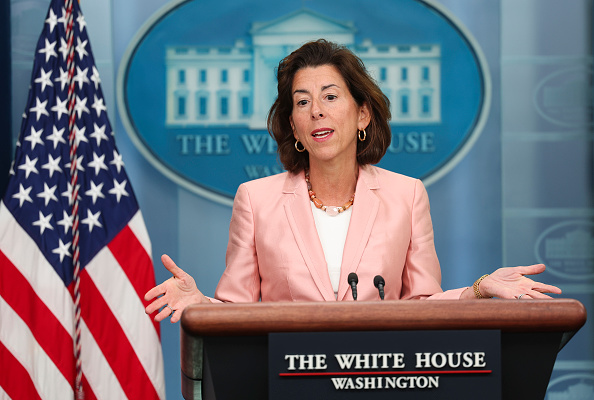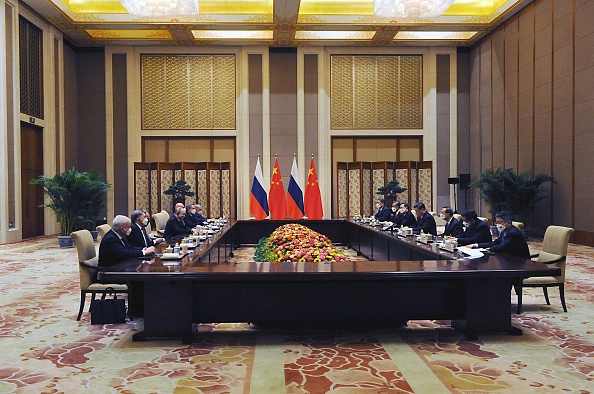
 Cutting Edges
Cutting EdgesA new set of Biden administration guidelines is banning U.S. technology firms that receive government funding from building "advanced technology facilities" in China for the next decade, as the administration plans to increase domestic production of semiconductors.
The guidelines were unveiled as part of a $50 billion plan aimed at building up the local semiconductor industry. Business groups facing a shortage of global microchips have experienced a slowdown in production, and have been pushing for more government support in an effort to reduce reliance on China.
The U.S. Chips and Science Act, approved by Congress in August, is a key U.S. government response designed to address the long-running technological dispute between Washington and Beijing.
"We're going to be implementing the guardrails to ensure those who receive CHIPS funds cannot compromise national security... they're not allowed to use this money to invest in China, they can't develop leading-edge technologies in China.... for a period of ten years," according to U.S. Commerce Secretary Gina Raimondo.
China's embassy in Washington previously opposed the bill, saying it was reminiscent of a "cold war mentality." At the same time, China continues to strengthen its efforts to develop its own semiconductor industry. Speaking at a Party summit, Xi Jinping renewed calls for China to step up the development of technology critical to its national security and urged top officials to play a more active role and focus on critical breakthroughs.
Meanwhile, the U.S. has kicked off the first gathering of Asian nations on an economic agreement envisioned by the White House as a counter to China's rising influence in the region. Talks at the Indo-Pacific Economic Framework, a platform advanced by the Biden administration, have centered around defining objectives under the platform's four pillars: trade, supply chains, clean energy and anticorruption.
Read more in "U.S. CHIPS Act Serves No One," by Sun Bingyan, Vice Director of Research Center for Intellectual Property and Technological Security at University of International, and Wang Dong, Professor and Director at the Institute for Global Cooperation and Understanding at Peking University.
 Expanding Relationships
Expanding RelationshipsChinese President Xi Jinping will meet his Russian counterpart Vladimir Putin in Uzbekistan on the sidelines of the Shanghai Cooperation Organization summit next week, according to Russia's Beijing envoy, during Xi's first trip abroad since the start of the COVID-19 pandemic.
Xi's meeting with Putin will also be the first face-to-face exchange between the two leaders since the Russian invasion of Ukraine earlier this year, and will come weeks before the 2022 National People's Congress, where Xi is expected to break with tradition and assume a third term in power.
"We are planning a serious, full-fledged meeting of our leaders with a detailed agenda, which we are now, in fact, working on with our Chinese partners," Russian envoy Andrey Denisov said.
Since the start of the Russia-Ukraine conflict, China has provided Russia with economic support, both as a supplier of goods as European and American companies pull out of Russia and as a buyer of energy exports that are no longer in demand in the West. Russia, for its part, has offered geopolitical backing to China, including in the escalating tensions around Taiwan.
 Bills, Bills, Bills
Bills, Bills, BillsChina has been hit with one of its worst earnings recessions on record as Beijing's zero-Covid policy continues along with a real estate crisis that are together taking a toll on the nation's listed companies. Nearly 5,000 companies listed in Shanghai, Shenzhen, and Beijing have released their earnings reports for the first six months of 2022, and over 50% posted a decline in net profit.
But while most businesses have taken a hit, twelve of China's top Covid testing firms have posted huge increases in both revenues and net profits for the first half of this year. Andon Health, a Covid test kit supplier both domestically and abroad, reported that its net profit shot up by 27,728%, reaching 15.24 billion yuan ($2.2 billion). This was the biggest increase recorded by any listed company in mainland China.
As revenue and net profits increase, diagnostics firms are also concerned about the risk of bad debt, as a rising number of customers are taking longer to pay their bills. Testing is a core part of China's strategy to contain Covid, and residents must take PCR tests every three days in order to use public facilities and go to work, even when cities aren't locked down. Local governments, who are responsible for covering the cost of mass-testing, are also hurting. As Covid-related spending continues to increase, declining business activities are hurting fiscal revenue, and making it hard to pay the mounting up costs. Testing companies said the growing amount of payments owed is one of their top concerns.
Prepared by China-US Focus editorial teams in Hong Kong and New York, this weekly newsletter offers you snap shots of latest trends and developments emerging from China every week, while adding a dose of historical perspective.
- 2022-09-01 A Win for Global Business
- 2022-08-26 A Heavy Price
- 2022-08-19 Risky Business
- 2022-08-12 Backtracking
- 2022-08-05 Cross-Strait Outrage
- 2022-07-29 Playing with Fire
- 2022-07-22 Nixonian Flexibility
- 2022-07-15 List Diplomacy
- 2022-07-08 Easing Tariffs, Not Tensions
- 2022-07-01 Getting Tough
- 2022-06-24 Tools in the Box
- 2022-06-17 Unprecedented Oversight
- 2022-06-10 Squaring Off
- 2022-06-03 Diplomatic Chills
- 2022-05-27 Competing Visions
- 2022-05-20 Common Ground
- 2022-05-13 Bilateral Interests
- 2022-05-06 Vying for Mutual Benefit
- 2022-04-29 Seeking Relief
- 2022-04-22 Tipping Point